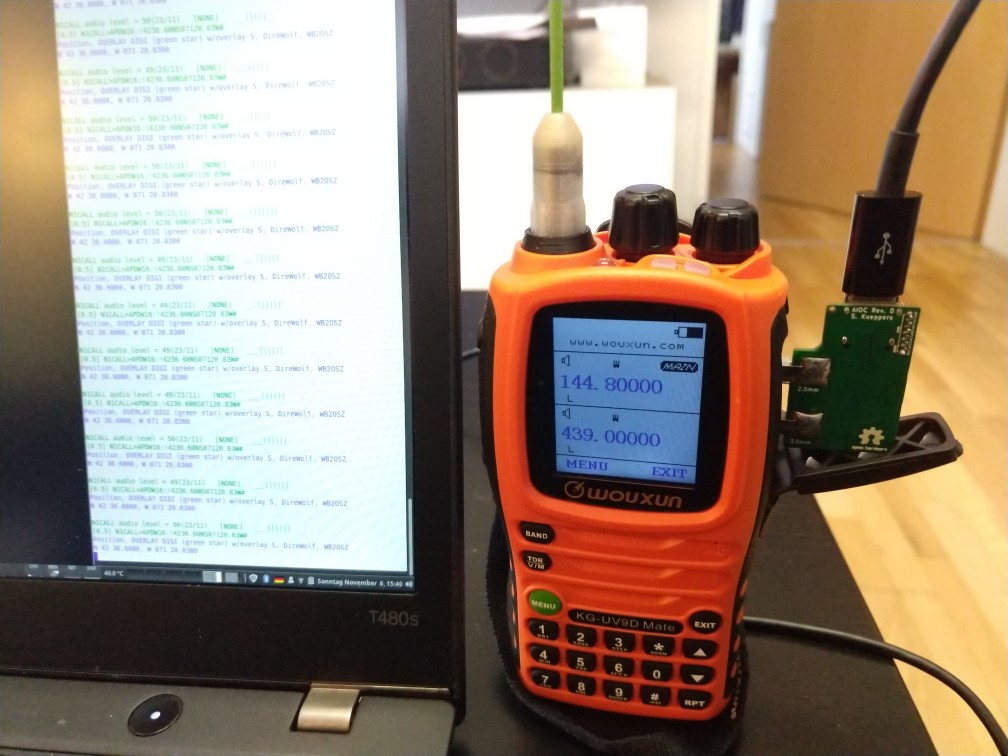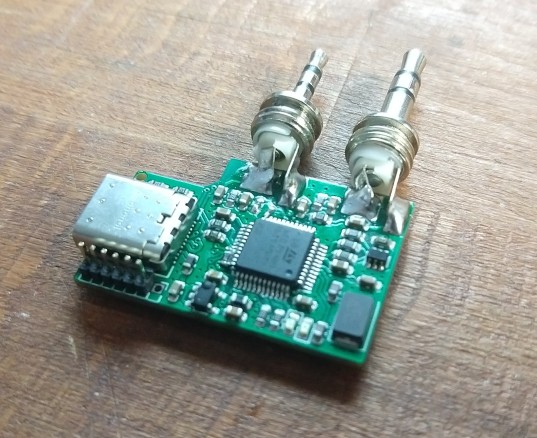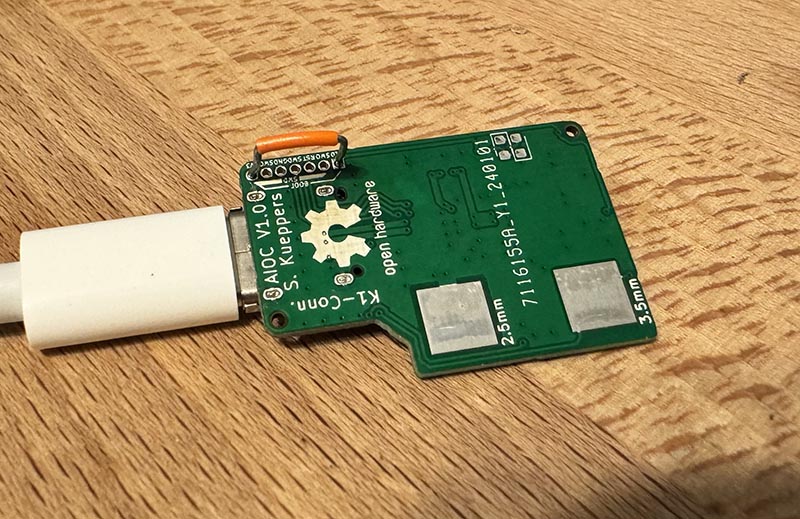AIOC
AIOC
This is the Ham Radio All-in-one-Cable. It is currently still being tested! Please read this README carefully before ordering anything.

What does it do?
The AIOC is a small adapter with a USB-C connector that enumerates itself as a sound-card (e.g. for APRS purposes), a virtual tty (“COM Port”) for programming and asserting the PTT (Push-To-Talk) as well as a CM108 compatible HID endpoint for CM108-style PTT (new in firmware version 1.2.0).
You can watch the videos of the Temporarily Offline and HAM RADIO DUDE YouTube channels below.
There is also a German 4-part article with instructions here.
Features
- Cheap & Hackable Digital mode USB interface (similar to digirig, mobilinkd, etc…)
- Programming Cable Function via virtual Serial Port
- Compact form-factor (DIY overmolded enclosure is currently TBD)
- Based on easy-to-hack STM32F302 with internal ADC/DAC (Programmable via USB bootloader using DFU)
- Can support Dual-PTT HTs
- Supports all popular OSes (Linux, Windows and MacOS with limitations [*])
Compatibility
Software
- Direwolf as AX.25 modem/APRS en+decoder/…
- AllStarLink as ASL Node
- APRSdroid as APRS en+decoder
- CHIRP for programming
- VaraFM
- … and more
Tested Radios (so far)
- Wouxun UV-9D Mate (CHIRP + APRS)
- Baofeng UV-5R (CHIRP + APRS)
- BTECH 6X2 (CHIRP)
- Quansheng UV-K5 (Quansheng Dock, Egzumer or regular)

How To Fab
- Go to JLCPCB.com and upload the GERBER-k1-aioc.zip package (under
kicad/k1-aioc/jlcpcb)- Select PCB Thickness 1.2mm (that is what I recommend with the TRS connectors I used)
- You may want to select LeadFree HASL
- Select Silkscreen/Soldermask color to your liking
- Check “PCB Assembly”
- PCBA Type “Economic”
- Assembly Side “Top Side”
- Tooling Holes “Added by Customer”
- Press Confirm
- Click “Add BOM File” and upload
BOM-k1-aioc.csv - Click “Add CPL File” and upload
CPL-k1-aioc.csv - Press Next
- Look Through components, see if something is missing or problematic and press Next
- Check everything looks roughly good (rotations are already baked-in and should be correct). Save to Cart
This gives you 5 (or more) SMD assembled AIOC. The only thing left to do is soldering on the TRS connectors (see here). The total bill should be around 60$ US for 5 pieces plus tax and shipping from China.
Note that the following message from JLCPCB is okay and can be ignored.
The below parts won't be assembled due to data missing.
H1,H2 designators don't exist in the BOM file.
J2,D3,D4,R17 designators don't exist in the CPL file.
Note for people doing their own PCB production: I suggest using the LCSC part numbers in the BOM file as a guide on what to buy (especially regarding the MCU).
Note the current hardware version is 1.0, but there is a version 1.2 currently in the making here that will feature
- support for an external hardware input (e.g. for COS)
- a split pad for the PTT/UART contact, so in case you would like to use the AIOC hardware for another purpose than a K1-style connector, you can separate these two signals that are otherwise connected to the same TRS contact.
- Adjustable input and output audio levels (line-level, mic-level)
How To Assemble
This is the process I use for building. See photographs in images folder.
- You need to use Monacor
PG-204PandPG-203Por compatible TRS connectors (2 solder lugs and a big tab for the sleeve connection). Adafruit products1800and1798are confirmed to work as well. - Cut the 2.5mm and 3.5mm TRS sleeve tab where the hole is located
- Put both TRS connectors into the 3d-printed solder guide (or a cheap HT that you don’t mind potentially damaging). Make sure, that they are seated all the way in. If the holes in the solder guide are too small, you can ream them using a 2.5mm and 3.5mm drill bit.
- Insert the AIOC PCB into the solder guide
- Solder sleeve tab on the back side for both TRS connectors first
- Turn around PCB and solder remaining solder lugs
- Optionally you can 3D print a case for your AIOC. This model has been designed by a third party but is confirmed to work with the AIOC.
Note It is unfortunately quite common that the TRS connectors have intermittent contact after soldering the ring or tip tabs. In this case, it helps to re-melt the solder joint, then using e.g. tweezer slightly assert some sideways force onto the contact and let the solder joint solidify while applying the pressure on the contact. This will keep some tension on the area where the tab internally connects to the barrel and thus give a solid (spring loaded) connection.
How To Build
For building the firmware, clone the repository and initialize the submodules. Create an empty workspace with the STM32CubeIDE and import the project.
git clone <repositry url>git submodule update --init- Start STM32CubeIDE and create a new workspace under
<project-root>/stm32 - Choose File->Import and import the
aioc-fwproject in the same folder without copying - Select Project->Build All and the project should build. Use the Release build unless you specifically want to debug an issue
How To Program
Initial programming
The following steps are required for initial programming of the AIOC:
- Short outermost pins on the programming header. This will set the device into bootloader mode in the next step.

- Connect USB-C cable to the AIOC PCB
- Use a tool like
dfu-utilto program the firmware binary from the GitHub Releases page like this:dfu-util -a 0 -s 0x08000000:leave -D aioc-fw-x-y-z.binNote that a
libusbdriver is required for this. On Windows there are additional steps required as shown here (DFuSe Utility and dfu-util). On other operating systems (e.g. Linux, MacOS), this just works ™ (provided libusb is installed on your system). On Linux (and MacOS), your user either needs to have the permission to use libusb (plugdevgroup) or you might need to usesudo. - Remove short from first step, unplug and replug the device, it should now enumerate as the AIOC device
Firmware updating
Once the AIOC has firmware loaded onto it, it can be re-programmed without the above BOOT sequence by following these steps.
Note This requires firmware version >= 1.2.0. For older firmwares, the initial programming sequence above is required for updating the firmware.
- Run
dfu-utillike thisdfu-util -d 1209:7388 -a 0 -s 0x08000000:leave -D aioc-fw-x-y-z.bin
This will reboot the AIOC into the bootloader automatically and perform the programming. After that, it automatically reboots the AIOC into the newly programmed firmware.
Note Should you find yourself with a bricked AIOC, use the initial programming sequence above
How To Use
The serial interface of the AIOC enumerates as a regular COM (Windows) or ttyACM port (Linux) and can be used as such for programming the radio as well as PTT (Asserted on DTR=1 and RTS=0).
Note before firmware version 1.2.0, PTT was asserted by DTR=1 (ignoring RTS) which caused problems with certain radios when using the serial port for programming the radio e.g. using CHIRP.
The soundcard interface of the AIOC gives access to the audio data channels. It has one mono microphone channel and one mono speaker channel and currently supports the following baudrates:
- 48000 Hz (preferred)
- 32000 Hz
- 24000 Hz
- 22050 Hz (specifically for APRSdroid, has approx. 90 ppm of frequency error)
- 16000 Hz
- 12000 Hz
- 11025 Hz (has approx. 90 ppm of frequency error)
- 8000 Hz
Since firmware version 1.2.0, a CM108 style PTT interface is available for public testing. This interface works in parallel to the COM-port PTT. Direwolf on Linux is confirmed working, please report any issues. Note that currently, Direwolf reports some warnings when using the CM108 PTT interface on the AIOC. While they are annoying, they are safe to ignore and require changes in the upstream direwolf sourcecode. See https://github.com/wb2osz/direwolf/issues/448 for more details.
Notes on Direwolf
- Follow the regular setup guide with Direwolf to determine the correct audio device to use. For the serial and CM108 PTT interfaces on Linux, you need to set correct permissions on the ttyACM/hidraw devices. Consult Direwolf manual.
- Configure the device as follows
[...] ADEVICE plughw:<x>,0 # <- Linux ADEVICE x 0 # <- Windows ARATE 48000 [...] PTT CM108 # <- Use the new CM108 compatible style PTT interface PTT <port> DTR -RTS # <- Alternatively use an old school serial device for PTT [...]
Notes on AllStarLink (ASL3)
Once your cable is emulating a CM108, it becomes quite simple to plug into your HT and setup a simple simplex AllStarLink node that talks to your favorite repeater or node.
In asl-menu, set:
- Device type:
usbradio(menu sections: 2 > A1 > N4 > I2) - Duplex type:
1(menu sections: 2 > A1 > N5)
Edit usbradio.conf (menu sections: 6 > H) (for a Puxing PX-888 cheap Chineese HT)
rxboost = 0rxsqhyst = 500carrierfrom = usbinvertctcssfrom = norxdemod = speakertxprelim = noinvertptt = no
Notes on APRSdroid
APRSdroid support has been added by AIOC by implementing support for the fixed 22050 Hz sample rate that APRSdroid requires. It is important to notice, that the exact sample rate can not be achieved by the hardware, due to the 8 MHz crystal. The actual sample rate used is 22052 Hz (which represents around 90 ppm of error). From my testing this does not seem to be a problem for APRS at all.
However, since APRSdroid does not have any PTT control, sending data is currently not possible using the AIOC except using the radio VOX function. See https://github.com/ge0rg/aprsdroid/issues/324. My previous experience is, that the Android kernel brings support for ttyACM devices (which is perfect for the AIOC) so implementing this feature for APRSdroid should theoretically be no problem.
Ideas such as implementing a digital-modes-spefic VOX-emulation to workaround this problem and let the AIOC activate the PTT automatically are currently being considered. Voice your opinion and ideas in the GitHub issues if this seems interesting to you.
Notes on CHIRP
CHIRP is a very popuplar open-source programming software that supports a very wide array of HT radios. You can use CHIRP just as you would like with a regular programming cable.
Download:
- Start CHIRP
- Select Radio->Download from Radio
- Select the AIOC COM/ttyACM port and start
Upload:
- Select Radio->Upload to Radio
- That’s it
Notes on VaraFM
Select “DTR only” for PTT Pin, so that the correct RTS/DTR sequence is generated for PTT
Known issues
There are known issues with EMI, when using a handheld radio with a monopole (i.e. stock) antenna. In this case, the USB cable will (inadvertently) work as a tiger-tail (counterpoise) and thus, high RF currents go through the USB lines which cause issues with the USB connection. Some people have connected cables between the radio and the AIOC and put a ferrite core on those wires, which seems to reduce those issues. I am trying to find out, which of the wires between the radio and the AIOC produce the problem, so that we might add SMD ferrites on the AIOC in the future
Future work
I encourage you to check for Pre-Releases announcing upcoming features. Currently we are working on
- Configurable AIOC: Change the way the PTT is asserted or the USB VID:PID that the AIOC uses using a Python script. These settings can be stored on the AIOC.
- Virtual-PTT: This feature allows your AIOC to be configured to automatically assert the PTT line when it receives TX data from your PC.
- Virtual-COS: The AIOC will notify your PC (e.g. using CM108 emulation) that there is audio data on the microphone input.





